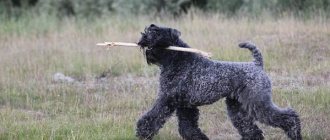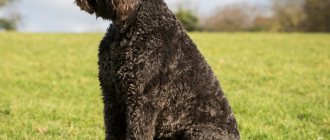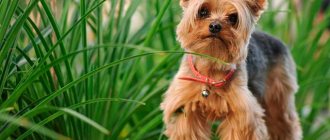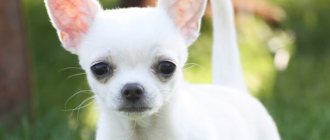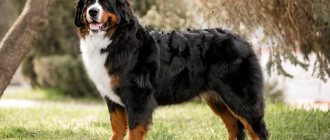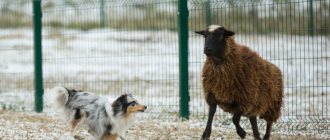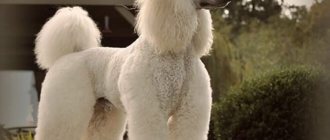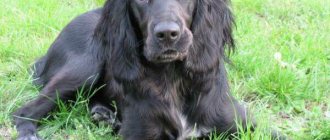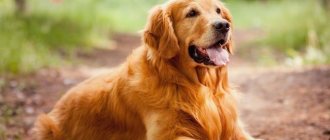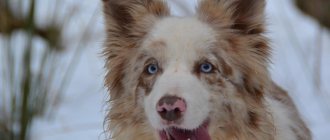Pets of the Kerry Blue Terrier breed have abundant and curled hair. A well-defined mustache and beard add color to these pets. Regular grooming of the Kerry Blue Terrier is the key to your pet's chic appearance and well-being. It is not easy to cut a dog's hair so that it retains the characteristic silhouette features required by the standard. The most hassle-free way to achieve a neat appearance for your pet is to contact experienced dog groomers.
Professionals who have mastered different Kerry Blue Terrier haircuts will be able to choose an option for your pet that will highlight the dog’s advantages. And minor exterior flaws will remain invisible.
How to cut a Kerry Blue Terrier
You may want to trim the fur of your favorite four-legged animal yourself, thinking that this is an easy task. But it is preferable to entrust the pet’s haircut to experienced people who thoroughly understand the intricacies of the breed. Grooming a Kerry Blue Terrier is a creative process for them. The craftsmen have special shampoos for dogs, intricate tools and bold ideas in their arsenal. Grooming Kerry Blue Terriers is only permissible according to certain rules.
Kerry Blue Terrier haircut diagram:
- Before cutting, the animal must be washed and the hair dried with a hairdryer.
- Kerry Blue ears should be cut against the grain. Use scissors to carefully trim the edges so that the ear resembles the shape of the letter V.
- The front of the neck is cut with a clipper.
- With a harmonious haircut, the pet's bangs begin in the area where the transition from the forehead to the face is visible.
- The dog's forehead should be trimmed with a pad.
- The hair above the bangs is kept short, and between the ears it is slightly longer.
- So that the fur that forms the eyebrows does not interfere with the dog’s vision, it is cut on the side near the eyes.
- It is important to harmoniously trim the dog's beard.
- The shape of the head of pets of this breed should resemble a rectangular parallelepiped.
- Anything that goes beyond the lines established by the standard is removed.
- The dog's shoulders and neck are cut short (with scissors).
Of course, cutting a Kerry Blue Terrier involves many more techniques than are listed here. Only a master can figure out how to cut a curly-haired fidget and what tools to use to trim the fur on a certain area of the dog’s body.
Breed standard
The Kerry Blue Terrier became a domestic dog, but did not lose the hunting instincts of its Irish ancestors. To this day, experienced owners reject angry or cowardly puppies.
Kerry Blue Terriers are friendly dogs, children's favorites and smart assistants to their owners. The playfulness of the Irish does not fade with age: they are resilient and strong. During walks, puppies will actively search and dig tirelessly.
Animals of this breed are stubborn and willful from childhood. The puppies will definitely find something to “answer” to their owner’s scolding. At the same time, they are obedient and devoted to their owner. Professionals say that these dogs are easy to train.
Important! Kerry Blue Terrier puppies are very attached to their owner. Choose a different breed if your home sits empty a lot. Otherwise, they will be sad, howl, and chew on sofas or armchairs.
"Blue dogs" look strong and elegant. They are compact, with well-developed dense muscles. Blue Kerry terriers have inherited a wary facial expression. A striking feature of the breed is its special coat. It is monochromatic, thick, silky, and almost does not shed. Puppies are born black, but by the age of 1.5 years they finally acquire a light or dark bluish color.
The gender type of Kerry Blue Terriers is well defined; the height of males reaches 49.5 cm, and that of females reaches 48 cm. The average weight is 15–18 kg. The breed of these dogs has many distinctive features, which are evaluated by competition commissions and breeders. The main characteristics are presented below.
| Criteria | Standard | Flaws | Vices |
| Character | Energetic, smart, active dog. Well trained. | Slowness, excitability. | Cowardice, aggression, uncontrollability or indifference. |
| Body type | Proportionally pumped up with a developed skeleton. The skin is soft and flexible. | Weak muscles. | Skinny or fat body. Wrinkles or folds. General frailty. |
| Format | Almost square. | Minor deviations from the standard. | Stretched or short. |
| Wool | Homogeneous, soft and thick with curls. Covers the dog's body tightly. | Not silky enough, dull. Poor quality haircut. | Pronounced disadvantages of the breed. |
| Color | Gray-blue. | — | Brown shade of fur. |
| Head | Elongated, with a slight stop. The nose is black with wide nostrils. Gums and palate are dark. | Tangible stop, short head, Light shades on the gums or palate. | |
| Ears | Thin, small, proportional, forming a triangle. Fit tightly to the dog's head. | Loose, disproportionately large, too heavy or low. | |
| Eyes | Dark or dark walnut, medium, well set. Insightful. | Too big or light. | |
| Teeth | Large, white, arranged linearly. Pincer or scissor bite. | Yellow coating, small size, abrasions. Lack of linearity. | Fallen, carious or broken. |
| Neck | Muscular, proportional, larger than the head. The dog's scruff is outlined. | Short or low set. | Weak, disproportionately small or large. |
| Withers | It is clearly expressed and smoothly turns into a straight line. | — | Small, large or narrow. |
| Back | Smooth, small, muscular. | Weak or slightly uneven. | |
| Small of the back | Inflated, medium, convex. | Smooth, narrow or elongated. | |
| Croup | Powerful, sharp, large. | Smooth, long. | Small. |
| Tail | Cut into thirds, large, even, standing upright. | Small, roughly cut. | Uncut, horizontal, hanging. |
| Breast | Convex flexible ribs, oval, proportionally large chest. | Too small or large. | |
| Stomach | Smooth, fit. | Slightly emaciated or sagging. | |
| Limbs | Strong, muscular. The dog's bones are strong. The rear ones are wider than the front ones. The joints on the knees are pronounced. Paws and claws are compact and strong. | Frail, too long, with a large distance between the paws. | |
| Movements | Active, driven, direct. | Slow, oblique direction, short steps. |
Important! Pronounced defects put an end to the dog career of representatives of the breed.
There's plenty to choose from
Cutting the head of a Kerry Blue Terrier requires special skills and effort. If you cut a dog's hair so that its head becomes round, it will be a serious mistake. At the same time, certain experiments with the appearance of a four-legged fashionista are quite acceptable. Calling a specialist to your home will save owners from many of the difficulties associated with hairdressing procedures. Masters can trim your dog’s existing haircut, which is overgrown, or they can please your pet with an exclusive hairstyle.
The following haircuts are very popular:
- Model.
- Exhibition.
- Elegant haircut for boys.
- Girlish option.
- Short haircut (ideal for the hot season).
Having discussed all the options for Kerry Blue Terrier haircuts with the hairdresser, you can choose the one that will be the most attractive for you and, of course, the most comfortable for your pet.
Veterinary services (services not listed in the price list are provided at a negotiated price.)
| Name of veterinary services | Cost, rub.) | ||||
| Initial appointment | 300,00 | ||||
| Repeated appointment | 100,00 | ||||
| Initial appointment with a specialist (surgeon, traumatologist, ornithologist, exotic animals, etc.) | 500,00 | ||||
| Repeated appointment with a specialist | 300,00 | ||||
| Consultation with a veterinarian | 0, 00 | ||||
| Consultation with a veterinarian based on test results without an animal | 150,00 | ||||
| Consultation for owners without animals by a specialist | 0,00 | ||||
| Fixation of small breeds of cats and dogs | 100,00-300,00 | ||||
| Fixing an aggressive animal | 500,00-1000,00 | ||||
| Calling a veterinarian to your home | 500,00 | ||||
| Calling a veterinary specialist to your home for medical procedures (excluding medications and manipulations) | from 500.00 | ||||
| Vaccination of animals with clinical examination: | |||||
| — imported rabies vaccine | 1300,00 | ||||
| — imported vaccine without rabies | 900, 00 | ||||
| — imported vaccine for cats with chlamydia without rabies | 1000,00 | ||||
| — imported vaccine for dogs with caronovirus without rabies | 1000,00 | ||||
| - rabies vaccine | 450,00 | ||||
| — vaccination against ringworm (Vakderm, Vakderm F) | 500,00 | ||||
| - vaccination of rabbits | 500,00 | ||||
| Registration of a veterinary passport | 100,00 | ||||
| Administration of medications: intramuscular, subcutaneous, oral, ophthalmic, drip, intravenous through a catheter, perrectum (without the cost of drugs) | 50,00 | ||||
| Intravenous administration of drugs (without the cost of drugs) | 100,00 | ||||
| Intravenous, drip administration of drugs, without the cost of drugs | 1 hour | 500,00 | |||
| Autohemotherapy | 1 procedure | 300,00 | |||
| Treatment of piroplasmosis | From 850.00 | ||||
| Blockades: | |||||
| - infiltration | 1 procedure | 750,00 | |||
| - conduction, nerve ganglion | 1 procedure | 1000,00 | |||
| -epidural | 1 procedure | 3000,00 | |||
| Placement of an intravenous catheter | 500,00 | ||||
| Removing the IV catheter | 150,00 | ||||
| Taking blood samples from a vein | 200,00 | ||||
| Subcutaneous infusion | 300,00 | ||||
| Puncture for cytological analysis | 1 procedure | 200,00 | |||
| Abdominal or thoracic puncture | 1000,00 | ||||
| Aspiration of fluid for ascites | 400,00-1200,00 | ||||
| Cystocentesis with urine aspiration | 400,00-800,00 | ||||
| Probing of the esophagus | 1 procedure | 1200,00 | |||
| Obstetrics | 1 hour | 1650,00 | |||
| Bladder catheterization: | |||||
| — cats/cats | 1000,00 | ||||
| — females/males | 1800,00/1300,00 | ||||
| Bladder sanitation | 200,00 | ||||
| Cleaning the paranal glands | 300,00 | ||||
| Cleansing enema | 700,00 | ||||
| Removing feces from the intestines during coprostasis | 300,00-500,00 | ||||
| Sanitation of the ears and ear canal | 300,00 | ||||
| Dressing wounds | 1 wound | 100,00-500,00 | |||
| Treatment of the wound surface | 1 wound | 150,00-500,00 | |||
| Removing Ixodid ticks | 1 tick | 150,00 | |||
| Taking and examining scrapings | 1 analysis | 550,00 | |||
| Chipping | 650,00 | ||||
| Reading the microchip number | 0,00 | ||||
| Nail trimming | 300,00 | ||||
| Beak Trimming | 300,00 | ||||
| Magnetotherapy | 1 procedure | 100,00 | |||
| Irradiation with UV lamp “Sun” | 1 procedure | 100,00 | |||
| Darsonvalization | 1 procedure | 100,00 | |||
| Oxygenation | 1 hour | 150,00 | |||
| Sanitary animal grooming: | |||||
| – small animals (up to 5 kg) | 1000,00 | ||||
| – medium animals (over 5 kg to 15 kg) | 2000,00 | ||||
| - large animals | 2100,00 — 4000,00 | ||||
| Sanitary washing of animals: | |||||
| – small animals (up to 5 kg) | 500,00 | ||||
| – medium animals (over 5 kg to 15 kg) | 1500,00-2500,00 | ||||
| - large animals | 2500,00- 5000,00 | ||||
| Plaster cast application (without reduction): | |||||
| – small breeds of dogs and cats | 1 bandage | 750,00 | |||
| -large dog breeds | 1 bandage | 1600,00 | |||
| Removing the plaster cast: | |||||
| – small breeds of dogs and cats | 1 bandage | 500,00 | |||
| - large breeds of dogs | 1 bandage | 1000,00 | |||
| Bone reduction | 1 fracture | 3150,00 | |||
| Reduction of dislocation | 1 procedure | From 1600.00 | |||
| Treatment of surgical sutures (excluding drug costs) | 1 procedure | 50,00-150,00 | |||
| Removing stitches | 1 area of operations will interfere. | 300,00 | |||
| Opening abscesses, hematomas, etc.: | |||||
| - without installing drainage | 1 wound | 1000,00 | |||
| — with installation of drainage | 1 wound | 1100,00-3500,00 | |||
| Injury to a veterinarian by aggressive animals, depending on the severity | 1000,00-10000,00 | ||||
| Surgery: | |||||
| Premedication | 350,00 | ||||
| Animal sedation | 450,00 | ||||
| General anesthesia: | |||||
| - cat | 500,00 – 800,00 | ||||
| – dog up to 5 kg | 500,00- 1000,00 | ||||
| – dog up to 10 kg | 100,00- 1300,00 | ||||
| – dog up to 20 kg | 1500,00- 2300,00 | ||||
| – dog up to 30 kg | 3000,00 | ||||
| – dog up to 40 kg | 3000,00-5000,00 | ||||
| - for every 10 kg | 500,00 | ||||
| Observation of the functional parameters of the animal’s vital organs during surgery (with incubation) | 1 hour | 300,00 | |||
| Surgery: | |||||
| 1st category of complexity (papillomas, skin defects, third eyelid adenoma, dewclaw amputation) | 1600,00 | ||||
| 2nd category of complexity (hernia repair, lymphodenectomy, resection of paranal sinuses, bougienage of the nasolacrimal duct, phlegmon.) | 2000,00- 3500,00 | ||||
| 3rd category of complexity (castration of cryptorchids, cosmetology, reposition of the eyeball, diagnostic laparotomy, urethrostomy, cesarean section and pyometra in cats.) | 3600,00- 5500,00 | ||||
| 4th category of complexity (tumor resection of the skin, plastic surgery, cystotomy, rectal prolapse, intussusception, rectal diverticulum, cesarean section and pyometra in dogs) | from 5600.00 | ||||
| 5th category of complexity (extrafocal osteosynthesis, limb amputation, rhinotomy, pancreatic resection, esophagoplasty, liver resection, gastric volvulus, excision of part of the stomach, sarcoma; for the removal of several tumors, the fee is charged in multiples of their number). | from 6500.00 | ||||
| Castration, sterilization (surgical intervention): | |||||
| - cats | 1800,00 | ||||
| - cat | 1200,00 | ||||
| — males weighing up to 5 kg. | 2100,00 | ||||
| — males with body weight from 5 kg to 15 kg | 3200,00-5500,00 | ||||
| — males with a body weight of 15 kg | from 5000.00 | ||||
| — females up to 5 kg | 2750,00 | ||||
| – females with body weight from 5 kg to 15 kg | 3150,00-5500,00 | ||||
| – females with body weight from 15 kg to 30 kg | 5000,00-7500,00 | ||||
| — with body weight from 30 kg | from 7500.00 | ||||
| Amputation of vestigial phalanges in dogs: | |||||
| - up to 2 weeks of age (with local anesthesia) | one phalanx | 400,00 | |||
| - from 2 to 4 weeks of age | one phalanx | 600,00 | |||
| -over 4 weeks of age | one phalanx | 1100,00 | |||
| Tail amputation in dogs: | |||||
| -up to 10 days of age (with local anesthesia) | 350,00 | ||||
| - from 10 to 2 months of age | 1100,00 | ||||
| -over 2 months of age | 1650,00 | ||||
| Ear cropping in dogs: | |||||
| -up to 10 days of age (with local anesthesia) | 2000,00 | ||||
| - from 10 days to 3 months of age | 3000,00 | ||||
| -over 3 months of age | 4000,00 | ||||
| Dental services: | |||||
| Ultrasound removal of tartar | the entire oral cavity | 1000,00 | |||
| Mechanical removal of tartar | for 1 tooth | 200,00 | |||
| Tooth extraction: | |||||
| - milk teeth in cats | for 1 tooth | 350,00 | |||
| - permanent teeth in cats | for 1 tooth | 600,00 | |||
| — cat/dog fang removal | for 1 tooth | 1000,00 | |||
| - milk and permanent teeth in dogs and rodents | for 1 tooth | 350,00-600,00 | |||
| Chipping (trimming) of incisors in rodents | 300,00 | ||||
| Laboratory diagnostics | |||||
| General urine analysis | 1 research | 500,00 | |||
| Express urine diagnostics | 6 indicators | 550,00 | |||
| Taking blood samples | 200,00 | ||||
| General stool analysis | 1 research | 600,00 | |||
| General clinical blood test | 1 research | 600,00 | |||
| Biochemical blood tests | 12 indicators | 1100,00 | |||
| — determination of total protein | 1 research | 90,00 | |||
| — determination of direct bilirubin | 1 research | 90,00 | |||
| - determination of total bilirubin | 1 research | 90,00 | |||
| - determination of urea | 1 research | 90,00 | |||
| - determination of amylase | 1 research | 90,00 | |||
| determination of gammaglutamine transferase | 1 research | 90,00 | |||
| — determination of alkaline phosphatase | 1 research | 90,00 | |||
| — determination of glucose | 1 research | 90,00 | |||
| - determination of creatinine | 1 research | 90,00 | |||
| - definition of AST (aspartaminotransferase) | 1 research | 90,00 | |||
| - determination of ALT (alanine aminotransferase) | 1 research | 90,00 | |||
| — determination of lactate dehydrogenase | 1 research | 90,00 | |||
| - determination of iron | 1 research | 90,00 | |||
| — determination of calcium | 1 research | 90,00 | |||
| - determination of magnesium | 1 research | 90,00 | |||
| — determination of inorganic phosphorus | 1 research | 90,00 | |||
| — determination of protein fractions | 1 research | 90,00 | |||
| — determination of pancreatic amylase | 1 research | 450,00 | |||
| - determination of total cholesterol | 1 research | 90,00 | |||
| — determination of tringlycerides | 1 research | 90,00 | |||
| Determination of hormones in blood serum: | |||||
| - progesterone | 1 research | 1000,00 | |||
| - estradiol | 1 research | 1000,00 | |||
| - testosterone | 1 research | 1400,00 | |||
| Testing for blood parasitic diseases | 1 research | 1000,00 | |||
| Helminthocoprological research | 1 research | 550,00 | |||
| Microscopic examinations for dermatophytes, demodicosis and ectoparasites | 1 research | 650,00 | |||
| Vaginal cytology | 1 research | 3800,00 | |||
| Histological examination of biological material | 1 research | 4500,00 | |||
| Cytological examination of tumors | 1 research | 3500,00 | |||
| Clinical diagnosis: | |||||
| Examination of bone tissue | 1 photo | 1000,00 | |||
| Ultrasound (ultrasound examination) of the entire abdominal cavity | abdomen | 1500,00 | |||
| Ultrasound | 1 area | 550,00 | |||
| Ophthalmoscopy | 1 research | 300,00 | |||
| Otoscopy | 1 research | 300,00 | |||
| Electrocardiography (ECG) | 1 research | 500,00 | |||
| Echocardiography, Doppler study of blood flow of internal organs and peripheral vessels | 1 research | 1300,00 | |||
| Wood's lamp test for microsporia | 200 | ||||
| Keeping an animal in a hospital (price does not include treatment and food): | |||||
| - small animals (hamsters, rats, ferrets, etc.) and birds | per day | 300,00 | |||
| – cats and dogs (up to 5 kg) | per day | 500,00 | |||
| – dogs up to 15 kg | per day | 800,00 | |||
| – cats and dogs (over 15 kg) | per day | 1000,00 | |||
| — infectious, cats and dogs (up to 5 kg) | per day | 800,00 | |||
| Euthanasia of animals: | |||||
| - up to 5 kg | 1000,00 | ||||
| – over 5 kg to 10 kg | 1100,00-1600,00 | ||||
| — over 10 kg to 20 kg | 1700,00-2100,00 | ||||
| — over 20 kg to 30 kg | 2100,00-2700,00 | ||||
| - small rodents | 300,00 | ||||
| Animal cremation (general): | |||||
| - up to 5 kg | 1000,00 | ||||
| – over 5 kg to 10 kg | 2000,00 | ||||
| — over 10 kg to 20 kg | 2500,00 | ||||
| -over 20 kg to 40 kg | 3500,00 | ||||
| — over 40 kg to 50 kg | 4000,00 | ||||
| — over 50 kg to 60 kg | 4500,00 | ||||
| — over 50 kg to 60 kg | 7000,00 | ||||
| — over 60 kg to 70 kg | 7500,00 | ||||
| — over 70 kg to 80 kg | 8500,00 | ||||
| — over 80 kg to 90 kg | 10000,00 | ||||
| — over 90 kg to 100 kg | 15000,00 | ||||
| - small rodents | 500,00 | ||||
| Individual cremation: | |||||
| - cat up to 4 kg | 3500,00 | ||||
| - dog depending on weight | 4000,00- 10000,00 | ||||
| - video report | 2000,00 | ||||
| — photo report | 1000,00 | ||||
| - with presence | 5000,00 | ||||
Grooming salon services:
Sports clipper haircut (bathing + haircut)
| Small dogs | 2300rub | 1.5 hours |
| Medium dogs | 2300rub | 2 hours |
| Big dogs | 2500rub | 2.5 hours |
| Spaniels, cockers (bathing, grooming) | 2300rub | 2 hours |
| Spaniels, cockers (model haircut) | 3000rub | 3 hours |
Small breeds (bathing+cutting+shaping)
| Shih Tzu | 2500rub | 2 hours |
| Pekingese | 2500rub | 2 hours |
| Bichon | 2500rub | 2 hours |
| Maltipoo | 2500rub | 2 hours |
| York | 2300rub | 2 hours |
| Bolonka | 2300rub | 2 hours |
| Spitz dwarf | 2300rub | 2 hours |
| Naked dog | 2300rub | 2 hours |
Poodles (sporty haircut, lamb haircut + bathing)
| Toy | 2300rub | 2 hours |
| Medium (small) | 3000rub | 2 hours |
| Dwarf | 2300rub | 2 hours |
| Royal (large) | 3000rub | 2.5 hours |
Poodles (lion cut, Scandinavian lion cut + bathing)
| Toy | 2500rub | 2.5 hours |
| Medium (small) | 3000rub | 2.5 hours |
| Dwarf | 2500rub | 2.5 hours |
| Royal (large) | 3000rub | 3.5 hours |
Poodles (modern style haircut + bathing)
| Toy | 2500rub | 2.5 hours |
| Medium(small) | 3000rub | 3 hours |
| Dwarf | 2500rub | 3 hours |
| Royal(large) | 3000rub | 4 hours |
Schnauzers (grooming + bathing)
| Giant Schnauzer | 3000rub | 4 hours |
| Miniature Schnauzer | 3000rub | 3 hours |
| Miniature Schnauzer | 2500rub | 2 hours |
Terriers (haircut + trimming + bathing)
| Erdel | 3000rub | 3 hours |
| Kerry blue | 2500rub | 3.5 hours |
Terriers (haircut + trimming + bathing)
| Welsh | 2500rub | 3 hours |
| Fox | 2500rub | 3 hours |
| Scotch | 2500rub | 3 hours |
Terriers (haircut + trimming + bathing)
| West Highland White | 2500rub | 3 hours |
| Wheat | 2500rub | 4 hours |
| Sky | 2300rub | 2.5 hours |
| Australian | 2300rub | 2 hours |
Terriers (haircut + trimming + bathing)
| Jack Russell | 2300rub | 2 hours |
| Toy | 2300rub | 1,5 hour |
Bathing and drying smooth-haired and short-haired dogs
| Small dogs | 1000r | 1,5 hour |
| Medium dogs | 1500rub | 1,5 hour |
| Big dogs | 2000rub | 1,5 hour |
Comb, bathe (de-shed, shape) for two groomers
| Collie | 3000rub | 4-5 hours |
| South Russian Shepherd | 3000rub | 4-5 hours |
| Bobtail | 4000rub | 4-5 hours |
| Newfoundland | 4000rub | 4-5 hours |
Comb, bathe (de-shed, shape) for two groomers
| Saint Bernard | 4000rub | 4-5 hours |
| Chow chow | 4000rub | 4-5 hours |
| German Shepherd | 2500rub | 4-5 hours |
Comb, bathe (de-shed, shape) for two groomers
| Golden Retriever | 2500rub | 4-5 hours |
| Spitz (medium, large) | 3000rub | 4-5 hours |
| Laika (straight wool) | 3000rub | 4-5 hours |
Comb, bathe (de-shed, shape) for two groomers
| Afghan Hound | 3000rub | 4-5 hours |
| Labrador | 2000rub | 2 hours |
| Rottweler | 2000rub | 2 hours |
| Husky | 2000rub | 2 hours |
Cats
| Wash + dry | 2000rub | 1 hour |
| Removing tangles (1 piece) | 500r | 10-15 min |
| Haircut (not including injection) | 2000rub | 2 hours |
| Combing | 2000rub | 2 hours |
| Wash + haircut | 2500rub | 1 hour |
| hourly wage in rubles | ||
| Coefficient for aggressive dogs and cats | from 1000r | |
| Neglect (matts, long hair, heavy soiling) | from 1000r | |
| Trimming | from 1000r | 1 hour |
| detailed work | ||
| Hygiene areas (face, paws, ears) | 500-1200rub | |
| Fixation | 500r |
Veterinary clinic
Animal vaccination
Veterinarian appointment
Animal surgery
Therapy for cats and dogs
Microchipping of dogs
Euthanasia of animals
Microchipping of dogs
Veterinary laboratory
Histology
Skin examination for dermatitis
Blood test for cat, dog
Blood test for babesiosis (cytoplasmosis)
Urine and stool tests
Cytology
Animal diagnostics
Diagnosis of infectious and invasive diseases
Digital diagnostics for animals
Ultrasound for pets
X-ray for animals
Electrocardiography (ECG)
Animal foster care
Day hospital
Intensive therapy
Infectious diseases hospital
24-hour hospital
Zoohotel
Animal surgery
Reduction of dislocations in dogs and cats
Castration
C-section
Treatment of fractures of any complexity
Surgical treatment of joint pathology
Urolithiasis disease
Abdominal surgery on animals
Sterilization
Veterinarians
Dermatologist
Oncologist
Veterinarian – Ophthalmologist
Visual diagnostics specialist (ultrasound, x-ray)
Exotic animal doctor
Dentist
Therapist
Traumatologist
Ophthalmologist
Surgeon
Grooming salon
Dog washing
Cheek washing
Beak trimming
Nail trimming
Haircut hygienic
Model dog haircut
Veterinary care at home
Assistance in childbirth for animals
Emergency vet visit
Groomer at home
Vaccination at home
Animal surgeries at home
To make the owner more comfortable
By contacting the salon, you will be convinced that the modern Kerry Blue haircut is a pleasant addition to your dog’s image. In addition, you won’t have to worry about your pet’s unpredictable reactions; experienced groomers will be able to organize the process in such a way that the dog will not panic or be picky. Sometimes getting to a dog stylist is simply unrealistic. Being busy at work and having small children can cause thoughts about grooming your dog to fade into the background. An excellent solution would be to call a specialist to groom your Kerry Blue Terrier at home. Groomers will groom your dog right in your own home.
For professional groomers, the Kerry Blue Terrier haircut standard is the main guideline that helps them avoid mistakes. Masters know how to maintain the line between fashion and the necessary characteristics of the breed, which cannot be encroached upon. This means that after a haircut, your pet will look organic and stylish.
Health
In general, the breed is very healthy, resistant to various viral diseases and adapted to various climatic conditions. Compared to other purebred breeds, Kerry breeds are less susceptible to hereditary diseases and pathologies, in fact they are quite rare.
Not often, but Kerry Blue Terriers have:
- Hypothyroidism: a disease of the thyroid gland.
- Skin cysts: Kerry often experiences bumps, these are epidermal cysts or sebaceous cysts and usually do not cause problems.
- Keratoses: Keratoses (nose and foot) are the formation of calluses, warts and calluses on the feet or nose. Often, painful corns can be inherited. Keratoses can be removed surgically or treated with antibiotics and corticosteroids.
- Cataract: Causes clouding of the lens of the eye, resulting in poor vision. The dog's eyes will be cloudy. Cataracts usually occur in old age and can sometimes be removed with surgery.
- Dry Eye: Keratoconjunctivitis sicca and pigmentary keratitis are two conditions that Kerry blues have and can occur simultaneously or separately. Dry eye occurs when the tear gland does not produce enough moisture.
- Chronic otitis externa: This is a chronic infection of the external ear canal, often caused by excessive hair in the ear, which encourages the growth of bacteria and fungi.
- Progressive neuronal abiotrophy (PNA): This is a rare inherited nerve disorder. Symptoms usually appear between 2 and 6 months of age.
- Hip dysplasia
